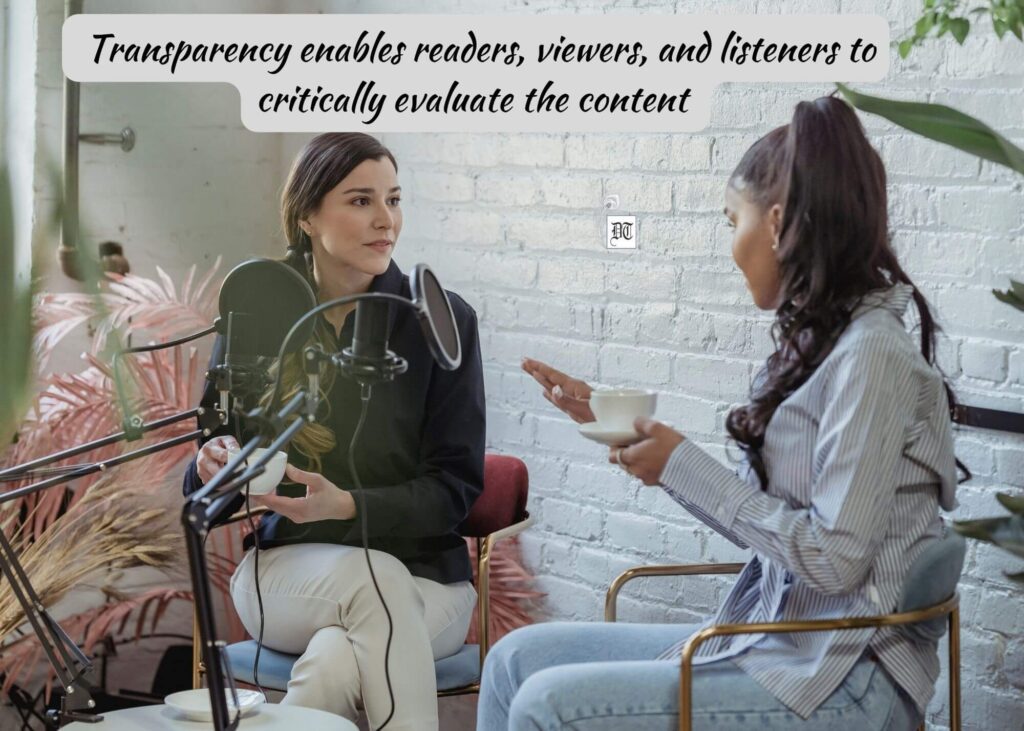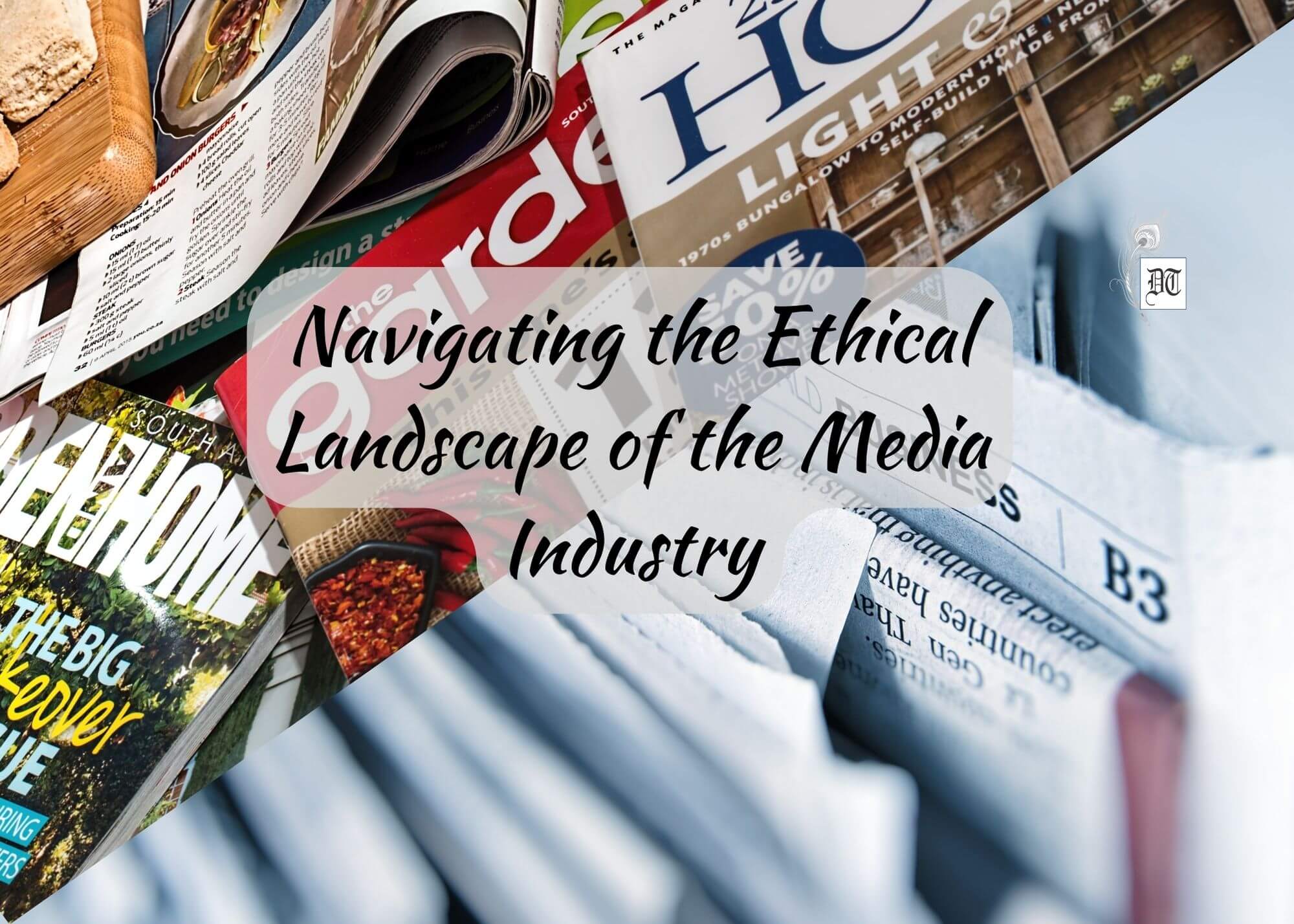An in-depth article by Arindam highlights the importance of upholding ethical standards in the media industry, highlighting challenges like truthfulness, privacy, sensationalism, conflicts of interest, and the role of media professionals. An exclusive for Different Truths.
The media industry faces ethical challenges when balancing its responsibilities to the public, advertisers, and stakeholders. This article explores the multidimensional character of media ethics, and the ethical dilemmas media professionals confront.
One of the most important ethical considerations in the media industry is truthfulness. Journalists are obligated to convey accurate and trustworthy information. It examines the difficulties of fact-checking, the influence of partiality, and the need for reporting transparency. The significance of objectivity in presenting information without personal or organisational bias is also discussed.
Media professionals must respect the privacy rights of individuals and obtain informed consent…
Another essential ethical consideration in the media industry is privacy. Media professionals must respect privacy rights of individuals and obtain informed consent when covering sensitive issues or interrogating individuals. This section explores the ethical implications of media intrusion into the private affairs of individuals, the use of covert cameras, and the invasion of personal space.
The media industry also faces ethical challenges related to sensationalism and conflicts of interest. This section examines the dangers of sensationalizing news stories and the importance of avoiding conflicts of interest that could influence reporting.
Media organisations can promote ethical journalism by establishing clear guidelines and standards for their correspondents, providing training and ongoing support to journalists, and cultivating an environment that encourages frank discussions about ethics. Media consumers can also play a role in promoting media ethics by discerning news consumers who question the origins and veracity of the information they encounter.
By adhering to ethical principles, journalists and media organisations can contribute to a more trustworthy and informed media landscape, nurturing public trust and fostering an informed society.
Here are some specific examples of how the media industry can promote ethical journalism:
- Establish clear guidelines and standards for correspondents. Media organisations should establish clear guidelines and standards for their correspondents that emphasize the importance of truthfulness, objectivity, privacy, and avoiding sensationalism and conflicts of interest.
- Provide training and ongoing support to journalists. Media organisations should provide training and ongoing support to journalists to help them understand and apply ethical principles in their reporting.
- Cultivate an environment that encourages frank discussions about ethics. Media organisations should cultivate an environment that encourages frank discussions about ethics so that journalists feel comfortable raising ethical concerns.
- Be discerning news consumers. Media consumers should be discerning news consumers who question the origins and veracity of the information they encounter. They should be aware of the potential for ethical lapses in media reporting and should be willing to hold media organisations accountable for their actions.
Sensationalism and Privacy in the Media
Sensationalism and privacy are two important ethical considerations for the media. Sensationalism is the practice of portraying news stories provocatively or exaggeratedly to attract attention. Privacy is the right of individuals to control the personal information that is shared about them.
Sensationalised reporting can also erode public trust in the media.
Sensationalism can have several negative consequences. It can distort facts, manipulate emotions, and influence public opinion. Sensationalised reporting can also erode public trust in the media.
Privacy is also an important ethical consideration for the media. Journalists have a responsibility to protect the privacy of individuals, even when reporting on newsworthy events. In some cases, journalists may need to obtain consent from individuals before publishing personal information about them.
The media can play an important role in upholding ethical standards by avoiding sensationalism and respecting privacy. Journalists should strive to report the news accurately and impartially, and they should be mindful of the potential harm that can be caused by publishing personal information.
Conflicts of Interest and Transparency
Conflicts of interest can also pose ethical challenges for the media. A conflict of interest occurs when a journalist’s personal or financial interests conflict with their obligation to provide accurate and impartial information.
Conflicts of interest can erode the media’s independence and integrity. Financial conflicts can give the impression of bias, as media outlets may favour individuals or organisations from whom they receive financial support. Political conflicts can lead to the manipulation of information or the publication of biased news stories that support the agenda of a particular political group. Personal conflicts can also obscure the judgement of journalists, resulting in biased reporting that reflects their personal beliefs or interests rather than the objective truth.
Transparency is essential to the management of conflicts of interest and the maintenance of public trust.
Transparency is essential to the management of conflicts of interest and the maintenance of public trust. Media professionals and organisations must prioritise informing their audience of potential conflicts of interest. This transparency enables readers, viewers, and listeners to critically evaluate the content they ingest and make informed judgements regarding its veracity and credibility.
Media organisations are crucial in promoting ethical practices and resolving conflicts of interest. Media entities must establish detailed guidelines and codes of conduct that explicitly address conflicts of interest. These recommendations should delineate the measures journalists, and reporters should take to identify, disclose, and manage potential conflicts of interest. Additionally, media organisations must provide training and support to their employees so that they can effectively navigate ethical dilemmas.
Sensationalism, privacy, and conflicts of interest are all important ethical considerations for the media. By avoiding sensationalism, respecting privacy, and being transparent about potential conflicts of interest, the media can uphold high ethical standards and contribute to a well-informed and democratic society.

Professional Integrity and Journalistic Independence
Journalists must uphold professional integrity and maintain journalistic independence in the face of conflicts of interest. They should keep their personal beliefs and interests separate from their reporting, and ensure their work is objective, fair, and accurate.
Conflicts of interest can be financial, political, or personal. They can arise in traditional media or new media.
Conflicts of interest can be financial, political, or personal. They can arise in traditional media or new media. When conflicts of interest are not managed effectively, they can threaten the integrity and independence of media content.
Media organisations should prioritise disclosure and transparency when managing conflicts of interest. They should also actively engage their audience and resolve their concerns regarding potential biases or conflicts.
By upholding ethical standards and ensuring that the public receives accurate and impartial information, media organisations can continue to serve as the linchpin of democratic societies.
Ethical Framework and Recommendations
The media industry faces ethical challenges, such as false news, biased reporting, and the exploitation of vulnerable individuals.
- False news is a major problem, as it can mislead the public and undermine democracy. In one case, a news organization spread a false rumour about a politician, which was widely shared on social media. This shows the importance of verifying information before reporting it.
- Biased reporting is another ethical challenge. In one case, a news organization consistently favoured one political party in its coverage. This raises concerns about journalistic objectivity and impartiality. Media professionals are ethically obligated to present the news in a balanced and objective manner.
- The exploitation of vulnerable individuals is also a serious ethical issue. In one case, a television network broadcast a reality show that exploited the personal struggles of individuals for entertainment purposes. This shows the importance of respecting the privacy and dignity of individuals, especially those in precarious situations.
Media professionals and organisations can address these ethical challenges by:
- Adhering to a code of ethics that includes the principles of accuracy, impartiality, objectivity, and respect for individuals.
- Establishing and enforcing rigorous ethical standards.
- Cultivating a culture of accountability and openness.
- Self-regulating and collaborating with industry bodies to develop and enforce ethical standards.
By upholding ethical standards, verifying information, providing fair coverage, and respecting the privacy and dignity of individuals, media professionals and organisations can regain the public’s trust and restore their credibility.
- The media industry is constantly evolving, and new ethical challenges are emerging all the time. It is important for media professionals and organizations to stay up to date on these challenges and to develop new ethical guidelines as needed.
- The public plays an important role in holding the media accountable. When the public sees ethical violations, they should speak out and demand that the media take action.
- By working together, media professionals, organisations, and the public can create a more ethical media landscape.
Ethical frameworks and guidelines are important for media professionals to follow to maintain trust and honesty.
Ethical frameworks and guidelines are important for media professionals to follow to maintain trust and honesty. Some of the most well-known ethical frameworks include the Society of Professional Journalists’ (SPJ) Code of Ethics and UNESCO’s journalism principles. These frameworks emphasise the importance of accuracy, impartiality, independence, and transparency in journalism.
In addition to these general frameworks, media organisations often have ethical guidelines that address specific issues relevant to their work. For example, some media organisations may have guidelines on how to handle conflicts of interest or how to use social media responsibly.
Media professionals need to be familiar with the ethical frameworks and guidelines that apply to their work. By following these guidelines, media professionals can help to ensure that they are upholding high ethical standards.
Here is a table that summarises the key points of the text:
Ethical framework Key points
SPJ Code of Ethics Emphasises the importance of accuracy, impartiality, independence, and transparency in journalism.
UNESCO journalism principles Promote media freedom, pluralism, and responsible reporting.
IFJ’s ethical guidelines Address issues such as conflicts of interest, veracity, and the preservation of sources.
Media Organisation’s guidelines Address organisation-specific issues such as editorial independence, conflicts of interest, and social media usage guidelines.
Self-Reflection and Conclusion
The media industry is essential for influencing public opinion, disseminating information, and holding those in authority accountable. However, it operates in a complex ethical environment where navigating truthfulness, objectivity, privacy, sensationalism, and conflicts of interest can be difficult.
We examined the significance of sustaining ethical standards in the media industry and the repercussions for preserving public trust and credibility. By scrutinizing case studies and investigating ethical frameworks, media professionals can more effectively navigate this complex terrain while fulfilling their ethical obligations to inform, educate, and engage the public.
The media’s primary role is to provide the public with accurate and trustworthy information…
The essential function that veracity plays in media ethics is one of the main findings of this article. The media’s primary role is to provide the public with accurate and trustworthy information, enabling individuals to make informed decisions. In recent years, however, the proliferation of misinformation and disinformation has presented significant obstacles to achieving this objective. To maintain the credibility of their reporting, media professionals must diligently verify information, fact-check their sources, and promptly remedy errors.
Another fundamental principle of media ethics is objectivity. Journalists should endeavour to present news stories fairly and unbiasedly, allowing readers and viewers to form opinions based on impartial information. However, due to individual biases and external pressures, complete objectivity can be difficult to attain. Media organisations should provide employees with guidelines and training to minimise bias and ensure balanced reporting.
Privacy is a crucial ethical consideration in an era where technology enables the enormous collection and dissemination of personal information. When reporting on private matters, journalists must exercise caution and respect the privacy rights of individuals unless there is a compelling public interest. To ensure responsible and ethical reporting, media organisations should also establish and adhere to explicit policies regarding the use of private information.
Sensationalism poses a significant ethical challenge in the media industry. The desire for higher ratings or a larger audience can entice journalists to prioritise sensational or scandalous stories over substantive news. Media professionals must balance engaging content and responsible reporting to gain public interest. This requires avoiding the distortion of facts and fabricating exaggerated narratives for sensationalism’s sake.
Conflicts of interest can compromise the credibility of media organisations and individual correspondents. Conflicts of interest, whether financial, political, or personal, can compromise the independence and credibility of reporting. To mitigate this ethical difficulty, media professionals should disclose any potential conflicts of interest and separate their personal and professional interests. News organisations should develop robust policies to ensure transparency and accountability in their reporting.
Ethical frameworks provide media professionals facing ethical dilemmas with valuable guidance. Utilitarianism, deontology, and virtue ethics are among the ethical theories that can guide media industry decision-making. Journalists can make more informed and ethically sound reporting decisions by contemplating the repercussions of their actions, adhering to moral principles, and cultivating virtues.
The media industry’s adherence to ethical standards is crucial for maintaining the public’s trust and credibility. Media professionals must navigate truthfulness, objectivity, privacy, averting sensationalism, and addressing conflicts of interest, among other fundamental principles. By analysing case studies and employing ethical frameworks, media professionals can better comprehend the consequences of their actions and make responsible choices. Media organisations should also establish explicit policies and train and promote an ethical journalism culture. By maintaining the utmost ethical standards, the media industry can continue to fulfil its vital duty of informing, educating, and engaging the public.
Picture design by Anumita Roy





 By
By

 By
By
 By
By